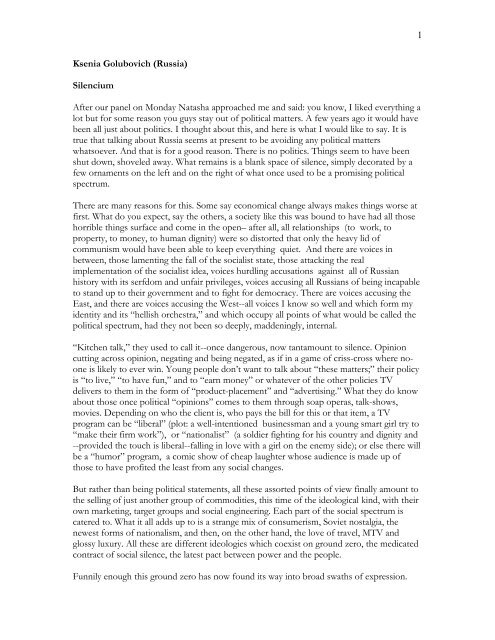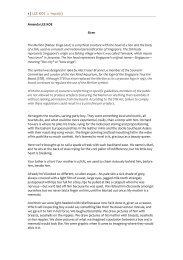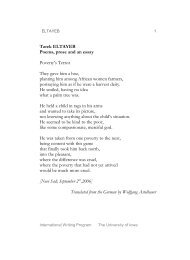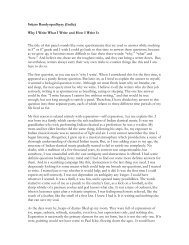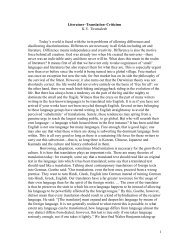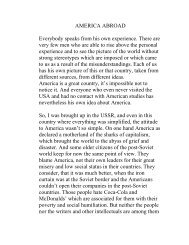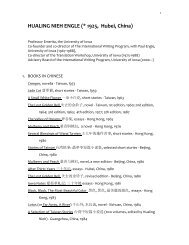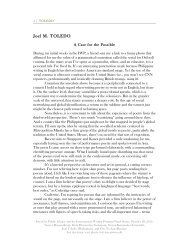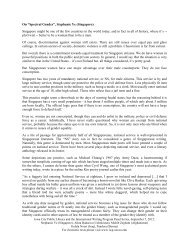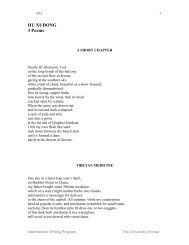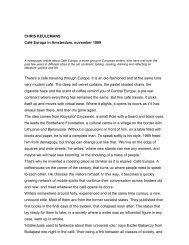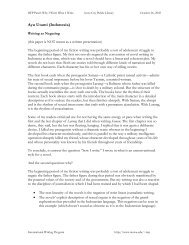Ksenia Golubovich - International Writing Program
Ksenia Golubovich - International Writing Program
Ksenia Golubovich - International Writing Program
You also want an ePaper? Increase the reach of your titles
YUMPU automatically turns print PDFs into web optimized ePapers that Google loves.
1<br />
<strong>Ksenia</strong> <strong>Golubovich</strong> (Russia)<br />
Silencium<br />
After our panel on Monday Natasha approached me and said: you know, I liked everything a<br />
lot but for some reason you guys stay out of political matters. A few years ago it would have<br />
been all just about politics. I thought about this, and here is what I would like to say. It is<br />
true that talking about Russia seems at present to be avoiding any political matters<br />
whatsoever. And that is for a good reason. There is no politics. Things seem to have been<br />
shut down, shoveled away. What remains is a blank space of silence, simply decorated by a<br />
few ornaments on the left and on the right of what once used to be a promising political<br />
spectrum.<br />
There are many reasons for this. Some say economical change always makes things worse at<br />
first. What do you expect, say the others, a society like this was bound to have had all those<br />
horrible things surface and come in the open– after all, all relationships (to work, to<br />
property, to money, to human dignity) were so distorted that only the heavy lid of<br />
communism would have been able to keep everything quiet. And there are voices in<br />
between, those lamenting the fall of the socialist state, those attacking the real<br />
implementation of the socialist idea, voices hurdling accusations against all of Russian<br />
history with its serfdom and unfair privileges, voices accusing all Russians of being incapable<br />
to stand up to their government and to fight for democracy. There are voices accusing the<br />
East, and there are voices accusing the West--all voices I know so well and which form my<br />
identity and its “hellish orchestra,” and which occupy all points of what would be called the<br />
political spectrum, had they not been so deeply, maddeningly, internal.<br />
“Kitchen talk,” they used to call it--once dangerous, now tantamount to silence. Opinion<br />
cutting across opinion, negating and being negated, as if in a game of criss-cross where noone<br />
is likely to ever win. Young people don’t want to talk about “these matters;” their policy<br />
is “to live,” “to have fun,” and to “earn money” or whatever of the other policies TV<br />
delivers to them in the form of “product-placement” and “advertising.” What they do know<br />
about those once political “opinions” comes to them through soap operas, talk-shows,<br />
movies. Depending on who the client is, who pays the bill for this or that item, a TV<br />
program can be “liberal” (plot: a well-intentioned businessman and a young smart girl try to<br />
“make their firm work”), or “nationalist” (a soldier fighting for his country and dignity and<br />
--provided the touch is liberal--falling in love with a girl on the enemy side); or else there will<br />
be a “humor” program, a comic show of cheap laughter whose audience is made up of<br />
those to have profited the least from any social changes.<br />
But rather than being political statements, all these assorted points of view finally amount to<br />
the selling of just another group of commodities, this time of the ideological kind, with their<br />
own marketing, target groups and social engineering. Each part of the social spectrum is<br />
catered to. What it all adds up to is a strange mix of consumerism, Soviet nostalgia, the<br />
newest forms of nationalism, and then, on the other hand, the love of travel, MTV and<br />
glossy luxury. All these are different ideologies which coexist on ground zero, the medicated<br />
contract of social silence, the latest pact between power and the people.<br />
Funnily enough this ground zero has now found its way into broad swaths of expression.
2<br />
The beginning of 2006 saw a new Russian blockbuster, Night Watch, a sequel to Day Watch,<br />
which was on the screen a year earlier. A fantasy mixed with action, this Russian version of a<br />
Hollywood product aspired to surpass the American products of the same type, at least on<br />
the local scene, for it uses very much the local scene and its particularities as its subjectmatter—e.g.<br />
the Big Battle between good and evil. The characters, their motives and their<br />
appearances, are wholly borrowed from Russian soap operas or film-series. Basically the film<br />
rearranges two sets of images: the “Good” ones are the Soviet-type, state-oriented people,<br />
the “Bad” are glossy and luxurious. The two groups coexist; each side with some<br />
supernatural power surpassing the normal human scope. The most horrible thing that can<br />
ever happen--according to the ideology of this film--is if the sides enter the final battle. Then<br />
all the middle-world, the world of the people where good and bad are mixed, will come to<br />
naught. Thus the answer is always balance of forces, equilibrium, a mutually agreed-upon<br />
abstaining from final words, that really lies underneath the multiplicity of ideologies and<br />
perspectives The interesting thing here of course is the very concept of “Good” and<br />
“Bad”–“Good” is seen as the “State” which provides electricity, water, heating and, if<br />
necessary, certain “repressions” of human rights, “Bad” is the individual striving for success<br />
that can go over other people’s heads but which makes life more interesting. These<br />
concepts are very relative, and presuppose that the final Truth will never be attained. This, to<br />
my mind, can be called the core and essence of the social peace in Russia. If all words and<br />
politics are senseless, the whole world is only about that balance of power, where<br />
Communists, state officials and liberals came to a mutual agreement. The interesting thing is<br />
of course that common or “average” people, have no say in any of this, whether in life or on<br />
screen, and that those who are in power are viewed as super-beings, elite groups fighting<br />
their own surreal battles, and providing us, their audience, with the safe and agreed-upon<br />
attitudes with which to identify…<br />
All language is theirs. We remain silent.<br />
As somebody once put it to me directly: “You want me to write an article for you; which<br />
type of attitude would you like me to stylize and emulate” He was not thinking about what<br />
he had to say; he was thinking about which kind of product I would like to order up and pay<br />
for. For it does not matter any more. As long as the “white drug container” stays the same,<br />
as long as everybody keeps quiet, it does not matter what sticker it carries. It has the attitude<br />
of Polonius.<br />
So, at this point I would like to play Hamlet.<br />
Hamlet says:<br />
Why, look you now, how unworthy a thing you make of<br />
me! You would play upon me; you would seem to know<br />
my stops; you would pluck out the heart of my<br />
mystery; you would sound me from my lowest note to<br />
the top of my compass … Call me what<br />
instrument you will, though you can fret me, yet you<br />
cannot play upon me.
3<br />
I would like to ask: what on earth are we so silent about If the political rhetoric is nothing<br />
more than bad theatre, every actor---before he or she even opens his or her mouth--knows<br />
what the words are that are so hushed and so unlikely to be spoken. Should, or must, we<br />
take the risk of breaking the silence that seems to suit everyone It is not only words such<br />
as Chechnya, the Kursk submarine, or Khodorkovky, or indeed Lenin and Che Guevara--<br />
that break this silence, distant—though troubling— echoes of the unspoken words, and<br />
names and deeds that really lie buried underneath the surface.<br />
Who are we—the nation of survivors trying to forget all those millions of victims in whose<br />
stead we now live, trying to forget the way we were all those 80 years; the compromises we<br />
and our families made; the lies we uttered, the lies which formed the very identities we now<br />
so easily buy and sell; we who wrote off our “historical debt” Why are we dragging our past<br />
on our shoulders in some desperate attempt to form a historic continuity where sharp<br />
rupture would have been much more preferable Why, finally, do we identify with the<br />
“State,” its history, its figures rather than with the victims, whose silent voices are left<br />
unheard Guilt does matter.<br />
If there is democracy to be had for us simple people, it can only come through the<br />
communion between the dead and the living, that ethical solidarity, that plea for forgiveness<br />
which can then form the foundation for and bring about the invention of a new politic. To<br />
break this silence is to break this wall; it is to listen to the dead and to that within the living<br />
which lies dead and buried. Not unlike in Germany which is still paying, which still hasn’t<br />
ceased to ask itself “how could we have done it” Had all those deprived, unheard, hushed,<br />
silenced people become our core and our sense then perhaps we simple Soviet people<br />
would not have experienced the harshness of the social reforms which, necessary though<br />
they were, had neither heart nor sympathy nor any sense of social responsibility. Perhaps<br />
now we would not find ourselves ruled by an ex-KGB agent, or indeed quarrelling about the<br />
double identity of the oligarch Mikhail Khodorkovsky—an ex-Komsomol activist turning<br />
oligarch, then turning against the ex-KGB president, jailed without trial nor any proof and<br />
sent to prison where so many people before him have found themselves. The very harshness<br />
of the ways those in power dealt with their previously much adulated “Soviet citizenry” is<br />
simply the continuation of the same old story. Why on earth should we have thought<br />
ourselves different<br />
I head of a young priest who, on arriving to one of the northern villages and learning that<br />
there was a whole graveyard of unknown corpses—the graveyard of Stalin’s prisoners--gave<br />
a sermon. “That’s a good one”—said the “local population”—“he gave last rites to the<br />
bones!”<br />
Politics starts with ethics. Ethics demands the pain of recognition. Only then and there can a<br />
new cultural discourse be built. Russia is silent in a new kind of way, not having yet found<br />
its words, or letting them be unheard. But the tragedy is there, the voices are there, the<br />
legacy is there--and the new life trying to live up to that legacy is also there. And the<br />
message of forgiveness, and asking for forgiveness, is also there. This message is not just<br />
local--it belongs to the world.<br />
And in the end I would like to read a poem written by the Russian poet Olga Sedakova to<br />
the French philosopher François Fedie. A poem immediately translated into many European
4<br />
languages. A poem dealing with what can be called our “European identity,” even while<br />
coming from Russia. A poem about the message, and its messenger called “Angel from<br />
Reims”. It is the figure of a smiling angel on a wall of the cathedral in Reims, France, the<br />
cathedral in which a long-suffering French people led by Joan d’Arc crowned their first king<br />
in the 15th century.<br />
The Angel of Reims<br />
Are you there—<br />
The angel is smiling<br />
I ask, though I know<br />
That you are surely there<br />
For I talk not just to anyone<br />
But to you<br />
A man whose heart shall never bare the treason<br />
Of your earthly King,<br />
Crowned here by his people<br />
And of that other Lord<br />
The King of Heavens, Our Lamb<br />
Dying in hope<br />
That you will hear me again;<br />
Again and again<br />
As every evening<br />
My name’s being told and sung<br />
Here, in the land of the splendid wheat<br />
And of the light vine,<br />
The crop and the grapes<br />
Drink in my sound—<br />
But nevertheless<br />
In this rose and crumbling stone<br />
Raising my arm<br />
That was broken off in the war<br />
Let me remind you:<br />
Are you there
5<br />
For plague, for hunger, for fire,<br />
For invasions of men, for anger of Heavens<br />
All that is important, but it isn’t the point.<br />
That’s not what I am to remind of<br />
That wasn’t the reason they’ve sent me.<br />
I say<br />
Are you<br />
There<br />
For the unbelievable happiness<br />
---


